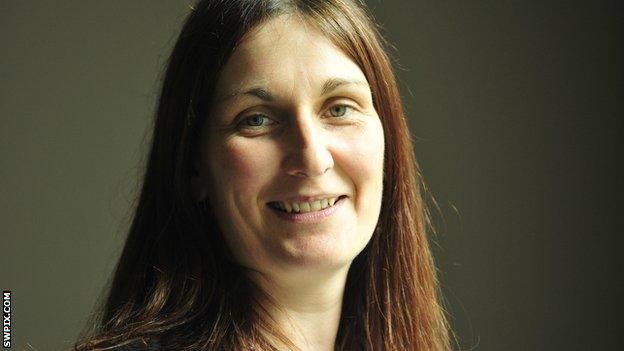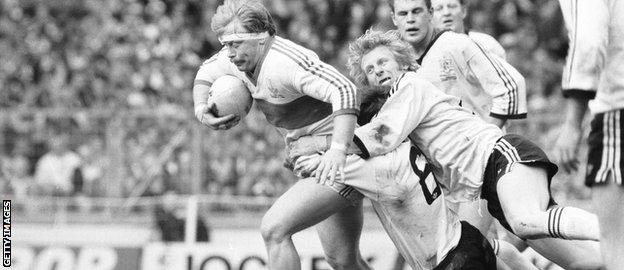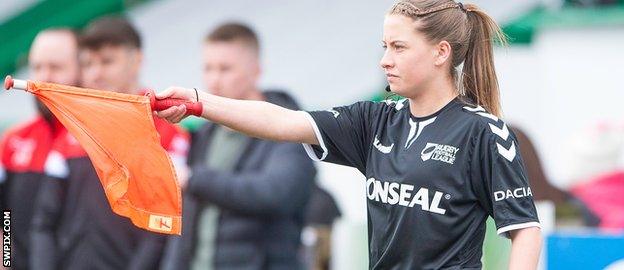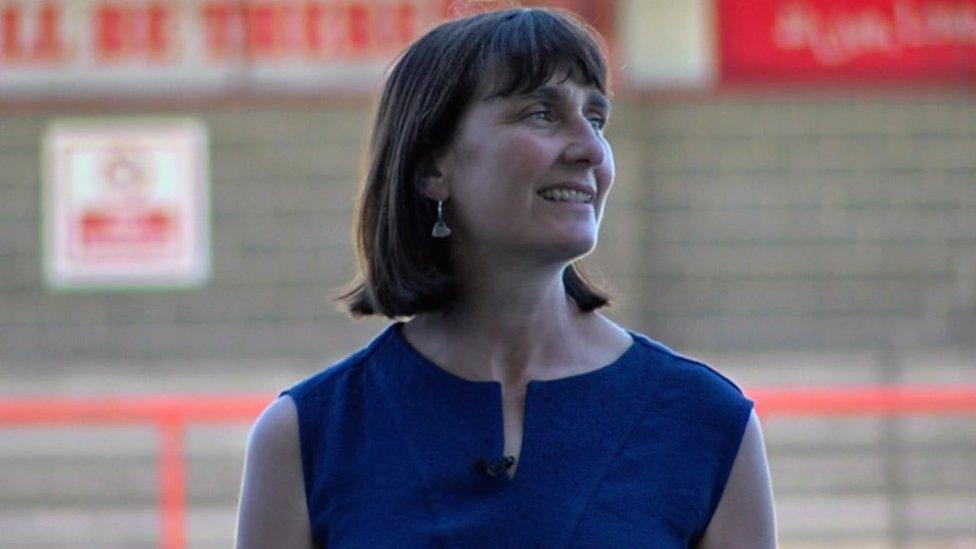Julia Lee: Women in rugby league is 'about equality of opportunity'
- Published

Julia Lee worked at the Rugby Football League, trying to make life easier for other women to work in the game
The city of Kingston-upon-Hull has produced some genuine rugby league heroes.
Amongst the names like Johnny Whitley, Phil Lowe, Eric Batten and Paul Cooke, you can certainly include Julia Lee.
In the late 1980s, within a macho sport far less diverse than it is now, Lee's work as a referee was a beacon for equality.
BBC Rugby League correspondent Dave Woods looked back on Julia's career as part of the 5 Live Rugby League Podcast.
'Oh, you're not a sir'
Having been denied the chance to play rugby league at school and local clubs, Lee ended up taking a different route into the game to become involved.
Rather than throwing cut-out passes or kicking goals, her modus operandi was to keep control - the woman with the whistle.
Julia Lee: "There was an advert on the terraces at Hull KR asking for referees, and at that time after a few pale ales I thought 'I can referee better than these clowns'.
"They bet me a fiver, 'dare you have a go and pick the whistle up', so I wrote to them and got a letter back saying: 'Dear sir, you're very welcome'.
"However, when I rang them up they said: 'Oh, you're not a sir'. And they said that was a bit different.
"It was the Hull society, who are all really good friends now, but it was unfamiliar. There had been one female referee before and they queried whether women could referee and they were frightened about where I was going to change.
"When I walked into the referee's meeting for the first time, it was like Stars in Their Eyes,, external because they all smoked then. It was like: 'Tonight Julia, you're the referee' as I emerged through the cloud."
'I found somewhere I really belonged'

Julia Lee's initial introduction to Hull KR coincided with a glory period for the Red and Whites, who reached the Challenge Cup final in 1980 and 1981
Julia's first introduction to rugby league had come after years of nagging and persuasion, with her late uncle reluctant to introduce his niece to the beer-fuelled raucousness of the terraces at Hull KR's old Craven Park.
However, her mother took her and her siblings down to Wembley in 1980 for the classic all-Hull Challenge Cup final at Wembley, won by Rovers 10-5 against their city rivals.
It was the trigger point, changing her life forever.
Julia: "I'd had a bit of a tough time at school, I didn't really belong and suddenly I found somewhere that I really belonged - people who had something in common, something they were really passionate about, the terraces themselves and the singing and the passion.
"I found something I really loved and felt part of as a 12-year-old girl. My mum called it my obsession and she wished she hadn't taken me, she'd taken us all.
"My brother is a black and white [Hull FC fan], and we don't talk about that much because he's brought his girls up in the same way. They used to get me going to the Hull FC shop for birthday presents, I went undercover!
"I went home and away, A-team, colts, wherever Rovers were, it gave me a purpose for being and I met friends for life."
'I came off the pitch crying'
The early memories of refereeing on Julia's 1987 debut are of cobbled-together kit and whistle, and being chucked a rule book and told to get on with it.
She refereed under-11s, "forgetting all the signals" as she puts it, and had to quickly acclimatise.
It was not long before she had moved to the capital to work as a nanny, and was introduced to the brutal world of amateur rugby league.
"I went straight to open age as I was now working in London. There were a lot of Australians and New Zealanders and it was fierce.
"I was 19, and they just started fighting. I didn't have a clue. I got to the 80 minutes and then came off the pitch crying.
"I learned my trade in Australia, I went to follow the Great Britain team in 1988 and decided I'd go out there, and ended up staying a year, and then refereeing in Manly. They had a really structured way of coaching match officials similar to what they do now.
"That's where I learned to referee, so when I came back I thought 'I can do this now, I've got the skills and the tools so let's crack on with this'."
'It's taken too long to break new boundaries'

St Helens hooker Tara Jones is also part of the Rugby Football League's match officials pool
Lee's presence as a female referee was an unusual sight in rugby league when started in the late-1980s, but the pathway is a little more well-trodden now.
Caitlin Beevers and Tara Jones, combined with the high-profile Australia match officials Kelsey Badger and Belinda Sharpe in the National Rugby League, are evidence of the pathway available.
Even more importantly, young women with the same passion as Julia are now able to play the game - like Beevers and Jones - with the advent of the Super League and increased focus on international competition.
Julia: "I'm proud of where the game has got to but it's taken too long for the game to get there.
"We're only just seeing the women's game begin to break new boundaries. It's taken too long, and we're still having questions about women's teams, their validity, where they play, whether they belong in the foundations (of men's teams) or within the clubs etc. That shouldn't be a question.
"Women should be able to participate in whatever sport and be involved however they want to be involved, but I'm not taking away from the fact the game is starting to sit up and make an effort.
"When I worked at the Rugby Football League it was about everyone being able to participate. It's about equity of access, and equality of opportunity."
You can hear more from Julia Lee and from Toronto Wolfpack superfan Sandy Shipley on the 5 Live Rugby League podcast here.
- Attribution
- Published4 July 2018
